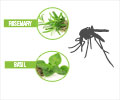Highlights:
- Over a billion of the world’s population is feared to be at risk of being newly exposed to mosquito-borne viral diseases such as dengue, Zika infection and chikungunya in the next 50 years due to the effects of global warming
- The study aims to understand the effects of the shift of the Aedes mosquitoes across the world due to global warming so that governments and health officials are prepared to meet these threats before they run out of control
- Aedes aegypti and Aedes albopictus are the two most common-disease carrying mosquitoes responsible for millions of deaths every year. They carry dengue, Zika viruses, chikungunya and possibly other new infections that could pose a major threat across the world
Read More..
Climate Change Emerging Threat of Mosquito-Borne Viral Fevers
- According to the World Health Organization (WHO), Aedes mosquitoes are perhaps one of the most common but deadly insects causing several diseases that result in millions of deaths annually
- Both Aedes aegypti and Aedes albopictus carry the viruses causing dengue and other fevers including chikunguniya and Zika infection and possibly other new infections that are expected to pose a major threat to the world population in the coming decades due to global warming
- The study team analyzed month by month temperatures to project transmission risk from 2050 and 2080. Although it does not predict which type of mosquito will shift across the globe, the study looks at climates where conditions for disease transmission would be favorable
- The two species of Aedes mosquitoes are expected to shift around the globe in the coming decades
- Almost all of the world’s population feared to be at risk of exposure to Aedes borne fevers
- As the global temperatures soar, it is expected that there will be year-round disease transmission in the warm tropics and seasonal risk of increased transmission almost everywhere else. The severity of infections is also expected to be greater
- Regions such as North America Europe and cooler places in the tropics which are now too cold for the viruses are expected to face increased threat in the future
- In places with more severe climate change exposures to the Aedes aegypti mosquito are expected to be proportionally worse.
- Paradoxically, in places with the most severe climate change such as southeast Asia and West Africa, major reductions are expected in Aedes albopictus borne infections, but unfortunately this is not good news say the authors
Carlson adds, "Any scenario where a region gets too warm to transmit dengue is one where we also have different but equally severe threats in other health sectors."
Summary
Scientists say that this is just one study aiming to predict the spread of the Aedes mosquitoes due to climate change. A region by region, organism by organism analytical study is essential to determine when and where threats are likely to occur to enable a suitable global health responseReference:
- Global expansion and redistribution of Aedes-borne virus transmission risk with climate change - (https://journals.plos.org/plosntds/article?id=10.1371/journal.pntd.0007213)
Source-Medindia












